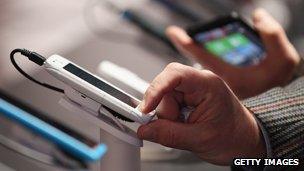Samsung Galaxy v Apple iPhone - the smartphone duopoly
- Published
- comments
Rory Cellan-Jones and CCS Insight's Ben Wood assess Samsung's new Galaxy phone
The excitement has been mounting for weeks. Fans have speculated about the precise specifications of the device, the company behind it has been doing everything it can to preserve the mystery and build up the anticipation. Yes, Samsung has learned quite a lot from Apple about the art of hype.
I've been to several major gadget launches - the original iPhone, Sony's PlayStation 3, Microsoft's Xbox Kinect - and last night's unveiling of the Galaxy S3 smartphone in London's Earl's Court may well have been the most over the top and extravagant yet. In the cavernous halls where everyone from Pink Floyd to Madonna has strutted their stuff, thousands gathered to see a rectangular slab of plastic and metal.
Why? Because only one smartphone has challenged - perhaps surpassed - the iPhone in terms of sales, technology and consumer appeal. And the latest version will undoubtedly set the standard for Apple and the rest of the industry to try to match.
For all the extravagant talk of a device which allows you to "live the life extraordinary", the latest Galaxy looks at first sight like any other modern touchscreen phone. It does have a bigger sharper screen than its predecessor, and some clever touches. There's a voice recognition function which seemed in the demo to do everything that Apple's Siri does and more, there's eye-tracking technology which means that the phone goes to sleep when you stop looking at it, and there's NFC (Near Field Communication) built in, allowing users to simply tap each other's phones to share content.
But at its heart is the latest Ice Cream Sandwich version of the Android operating system - and that's on plenty of other impressive phones from the likes of HTC, LG and Sony. Why the new Galaxy matters is that the previous models have established it in consumer minds as the number one Android phone - and in this business, it's increasingly apparent that the winner takes all.

Could there soon be only two players left standing?
Look across the wider smartphone battlefield, and it seems that there could soon be just two players left standing. Last week Apple revealed that it had sold 35 million iPhones in the last quarter, a figure that left industry analysts gasping for breath. Only for them to suffer another fainting fit on learning that Samsung had sold more than 44 million smartphones in the same period. With the Korean firm's cheaper phones also roaring ahead, it has now overtaken Nokia as the world's biggest mobile maker.
But what is truly astonishing is the share of industry profits these two companies are winning. Look at this infographic of recent profit trends, external in mobile phones, compiled by a respected mobile industry analyst, Horace Dediu.
It shows that Apple captured 73% of phone industry profits over the last three months, with Samsung getting 26%. HTC got 1% and the rest made losses, or profits so small they barely register.
From the mobile operators' point of view this emerging duopoly must be deeply worrying. Having been forced to bend to Apple's will, they were very happy to see the emergence of Android, with its promise of a multitude of manufacturers competing for their attention. Now it looks as though Samsung is in position to call all the shots in the Android market.
What happens next? Could RIM, which has been previewing its new Blackberry 10 system this week, make a comeback in the autumn with innovative phones that revive its appeal? Will Nokia's Lumia range - apparently doing reasonably well in the United States - pull the Finnish giant out of its death spiral? Or will a Chinese giant like Huawei start flexing its muscles in Western markets?
The mobile networks will hope that all of those eventualities - however unlikely - come to pass. But in the meantime, they will all be helping Samsung with its massive marketing push behind the Galaxy S3 - and making it into an inevitable and very profitable hit.